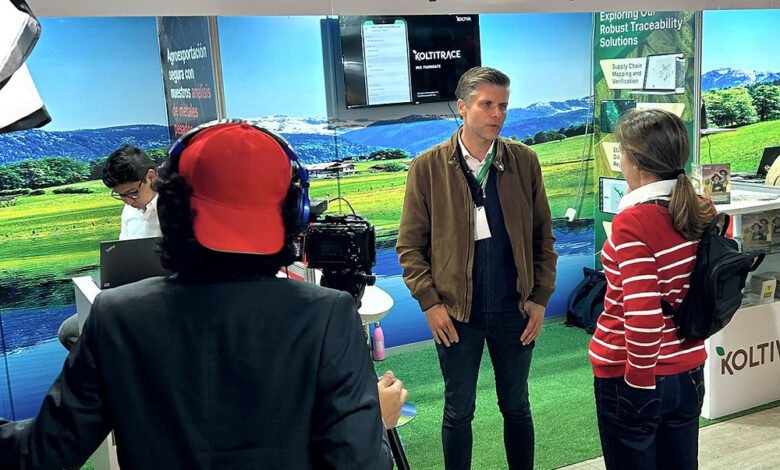EUDR Extended Deadlines: KOLTIVA Urges Early Action for Latin American Exporters
• Latin America is crucial to the EU's agricultural imports, with significant exports of coffee, cocoa, and other commodities. In 2023, Brazil’s coffee exports to Europe totalled $7.35 billion, Colombia followed with $2.9 billion, and Peru exported $102.12 million in premium cocoa beans. (Trading Economics, 2024). • Deforestation challenge. Latin America is responsible for 44% of global tropical deforestation, intensifying the need to align supply chains with deforestation-free standards to maintain EU trade access. (Forest Trends, 2021). • Despite the postponement of the EUDR deadlines to 2025 for large companies and 2026 for SMEs, Latin American businesses including Cooperative & SMEs must act quickly to meet its stringent standards.

Bogota, December 4, 2024 – Forests are essential to life on Earth, yet deforestation persists, disrupting ecosystems, and accelerating climate change. A Forest Trends report revealed that nearly 60% of tropical forest loss between 2013 and 2019 was driven by commercial agriculture. Latin America, responsible for 44% of global tropical deforestation, faces pressure to align supply chains with deforestation-free standards to retain access to EU markets. Brazil, losing 1.7 million hectares of forest annually, drives one-third of global tropical deforestation, positioning it at the center of global sustainability efforts.
To address global deforestation concerns, the EU enacted the European Union Deforestation Regulation (EUDR) under its Green Deal framework, aiming to remove deforestation-linked products from its market. Despite the postponement of the EUDR deadlines to 2025 for large companies and 2026 for SMEs, Latin American businesses must quickly meet stringent standards to safeguard key exports like soy, coffee, cocoa, beef, and rubber ensuring continued EU trade relations.
Latin America plays a pivotal role in EU agricultural imports. In 2023, Brazil’s coffee exports reached $7.35 billion, followed by Colombia with $2.9 billion. Peru, known for its premium cocoa, exported $102.12 million in cocoa beans to Europe. This significant trade highlights the pressure Latin American countries face in meeting EUDR requirements while maintaining their role as crucial suppliers to the EU.
For businesses in Latin America, this regulatory shift brings significant challenges. The lack of transparency and traceability in supply chains is a major obstacle. Without proper compliance, exporters face restricted EU market access, financial penalties, and potential damage to their reputations, risking billions in export revenues. For many Latin American producers, including cooperatives and SMEs, complying with the EUDR is not just an environmental obligation but a critical business necessity.
At KOLTIVA’s recent webinar, Beyond Traceability Talks, CEO and Co-Founder Manfred Borer highlighted the obstacles faced by Latin American businesses. “Infrastructure limitations, technological barriers, and the high cost of compliance make it challenging for many Latin America Exporters like Cooperatives & SMEs to provide verifiable data about product origins,” he noted. “A strategic balance between economic viability and environmental responsibility is essential.”
One of the primary obstacles for Latin American exporters is the lack of established supply chain transparency. Many businesses still rely on outdated data collection methods that are inconsistent and incomplete, making compliance with the EUDR difficult. The complexity of risk assessment and Due Diligence Statements (DDS) further complicates the process, especially for SMEs that lack the necessary resources and expertise to meet these stringent requirements independently.
To help navigate these challenges, KOLTIVA’s Senior Head of Markets Latin America, Silvan Ziegler, explained, “At KOLTIVA, we work closely with clients who are committed to implementing sustainable solutions, even when financing them independently. For smaller companies and cooperatives, we adjust costs and collaborate with international organizations to support the establishment of sustainable systems. This tailored approach ensures that businesses of all sizes can implement the necessary measures to remain compliant and sustainable.”
KOLTIVA’s innovative, modular solutions—KoltiTrace, KoltiSkills, and KoltiVerify—ensure end-to-end compliance with EU requirements. It enables businesses to achieve supply chain transparency and sustainability, laying the foundation for long-term success with some dashboard available i.e. the EUDR Compliance Dashboards, enabling businesses to gain a visual representation of their adherence to EUDR regulations and conditions. These dashboards provide valuable insights, including metrics like the total hectares of non-compliant producers in deforested areas, as well as the number of non-compliance plots and producers. By leveraging real-time data sourced from users and our field agents, companies can make well-informed decisions to improve compliance efforts.
The Supply Chain Linkage Dashboard offers an in-depth analysis of producer compliance data. It breaks down compliance metrics, such as Deforested Status, Land Approved for Farming, Spatial Legality Violations, and Compliance Status, from producers to individual polygon numbers. This granular approach allows businesses to gain precise insights into their adherence to EUDR regulations. By identifying non-compliant farmers, companies can investigate specific cases using the farmer’s name and polygon data. This detailed compliance pattern analysis enables businesses to address issues effectively, improve compliance, and drive meaningful changes with the Supply Chain Linkage Dashboard.
The Transaction Traceability EUDR Dashboard provides users with the ability to track various compliance metrics related to transactions. Users can easily monitor total number of transactions, total number of producers, total contributed weight from producers (in kilograms) compliant with EUDR regulations. Business users can efficiently analyze transactional data, identify compliance trends, and ensure adherence to EUDR regulations throughout the supply chain.
Learn more about the actionable strategies for businesses, cooperatives, and SMEs to achieve compliance and drive sustainable agricultural practices across Latin America. Watch the on demand webinar at https://www.koltiva.com/beyondtraceability-talks.





